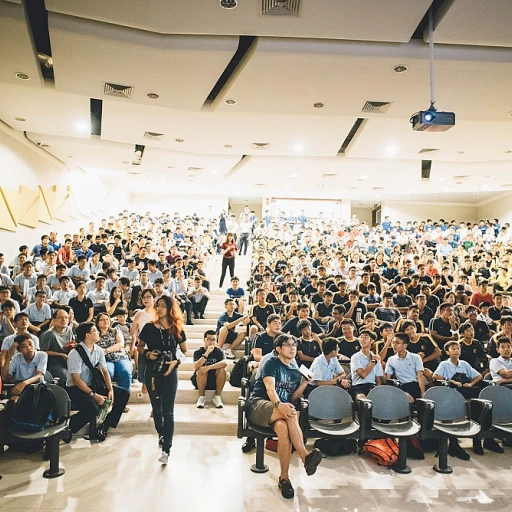
Understanding the Role of Coaching and Mentoring in Upskilling
The Dynamics of Guidance and Support
In today's rapidly evolving professional landscape, the importance of upskilling cannot be overstated. Coaching and mentoring play a pivotal role in this ongoing journey of skill enhancement. These supportive roles not only help individuals acquire new competencies but also offer a framework for continuous professional growth. The dual approach of having a coach alongside a mentor allows for both broad strategic insights and focused personal guidance. Coaches and mentors bring different perspectives together to form a cohesive support development structure within organisations. While coaching often focuses on training related to specific skills or performance objectives, mentoring provides a broader view of professional development, guiding individuals throughout their career paths. When integrated effectively, these approaches create a robust mentoring network that supports individuals in reaching their full potential. A coaching supervision model contributes significantly to this dynamic. It ensures that mentors and coaches themselves are continuously improving and adapting their approaches. Network coaching, as a part of talent management strategies, empowers employees to take charge of their own learning journeys, while also ensuring that organisational goals are met. Professional development can be further amplified through access to virtual coaching and mentoring networks, making guidance more readily available, irrespective of geographical constraints. This allows individuals to participate in a global mentoring network, exposing them to diverse perspectives and a broader array of experiences. As we delve deeper into the structure of effective upskilling mechanisms, it becomes clear that coaching and mentoring, despite their differences, are indispensable to organisations striving to build a strong culture of continuous improvement. For those seeking an in-depth understanding of effective coaching relationships in the realm of upskilling, building-effective-coaching-relationships-for-upskilling offers valuable insights into nurturing these essential connections.Identifying the Right Mentors and Coaches
Finding the Right Guides for Your Professional Journey
In the quest for effective upskilling, identifying the right mentors and coaches is crucial. These individuals play a significant role in guiding you through professional development, talent management, and skill acquisition. But how do you pinpoint the ideal guide amidst a sea of options? Start by understanding their roles and how they align with your personal and career goals.
First, consider the professional background and expertise of potential mentors and coaches. Evaluate whether their experience and coaching style resonate with your learning needs. It's essential to view potential coaches through the lens of your professional aspirations and the practical steps they can offer in supporting development.
In addition to personal alignment, look for coaches who are part of larger coaching networks or partner organisations. These structured environments often provide access to diverse training resources and a broader range of professional viewpoints. Engaging with a mentor in such a network can enrich your learning journey significantly.
- Leverage Technology: In today's digital age, virtual platforms offer immense potential to connect with coaches and mentors who might not be geographically accessible. Utilise online resources to explore potential mentors beyond your immediate vicinity.
- Engage with Team Coaching: Sometimes, the most impactful guidance comes from a team of coaches. These settings allow for a broader range of insights and collaborative approaches to problem-solving.
- Use Supervision and Feedback: Effective coaching and mentoring often involve regular supervision and feedback mechanisms. Seek mentors who are committed to providing constructive critiques and continuous support.
To unlock potential, bridging gaps between your current capabilities and your desired skill set requires strategic mentorship. In this view, pursuing an organized mentoring network is vital. For more insights on the power of mentorship programs for adult upskilling, explore unlocking potential through guided learning.
Building a Supportive Network
The Cornerstone of Supportive Ensembles
Building a supportive network for coaching and mentoring is crucial for any organization aiming to enhance their talent management and professional development initiatives. Having a strong network of mentors and coaches not only enhances the overall training process but also ensures that the professional values align with the goals of skill enhancement. Establishing this network involves multiple layers and perspectives that bring life to the coaching and mentoring experience.
Create Access and Inclusivity
An effective mentoring network begins with inclusivity. It's important to provide individuals at all levels the chance to engage with coaches and mentors. Inclusivity doesn't just happen by chance; it requires deliberate actions, such as ensuring access through fair practices and policies. Organizations may need to partner with external professionals or leverage virtual platforms to widen this access. This contributes to breaking barriers and promoting a diverse view within the coaching network.
Engage in Collective Learning
Collective learning is another essential component. Gathering teams for reflective practices and shared experiences strengthens the mentoring network. Utilizing methods such as team coaching and coaching supervision helps enhance group dynamics, allowing for a more robust exchange of insights and strategies. Essentially, it's about viewing skill development not just as an individual effort but as a team-driven process.
Identify Key Roles
Within any mentoring network, the definition of key roles is paramount. Identifying coaches, mentors, supervisory figures, or directors who take ownership of areas ensures there are clear avenues for support. Mentors should not only have professional experience but also the capability to offer guidance, which is practical, relevant, and sustained over time. Appointing individuals for these roles expresses a level of commitment to the mentoring network that speaks volumes to improving the organization’s skill base.
Leverage Technology as a Tool
In today’s digital landscape, technology can be a powerful ally. Leveraging virtual tools for hosting coaching sessions and distributing content allows organizations to adapt to modern demands for accessibility and scalability. Access to rich, diverse content and practical supervision via digital means can enhance the learning experience, making coaching and mentoring more effective and aligned with today’s fast-paced environments.
Leveraging Technology for Effective Mentoring
Embracing Digital Tools for Enhanced Support
In today's fast-paced world, technology plays a crucial role in transforming the landscape of coaching and mentoring. Professional development is increasingly supported through virtual means, offering broader access to resources and experts. Here's how technology is shaping effective mentoring networks:- Virtual Platforms: Utilising virtual platforms can foster connections between mentors and mentees without geographical constraints. This means the opportunity to view and engage with experts worldwide, breaking the barriers that once restricted access to niche knowledge. Organisations benefit by supplementing talent management through international perspectives.
- E-learning Tools: Incorporating e-learning tools allows for the integration of practical training content that supports skill development. Coaches and mentors can use simulations, webinars, and online workshops to create interactive views that enrich the learning experience.
- Network Integration: Digital tools facilitate network coaching by offering seamless integration into existing networks. This eases communication between directors, coaches, and mentors within partner organisations, enabling a collaborative environment that fosters continuous support development.
- Supervision at Scale: Implementing technology in coaching supervision leads to scaling efforts without losing the personal touch. Remote supervision enhances ongoing role evaluations for coaches and mentors, ensuring that both are aligned with organisational goals.
Measuring the Impact of Coaching and Mentoring
Evaluating the Success of Upskilling Initiatives
In the dynamic world of professional development, assessing the effectiveness of your coaching and mentoring network is paramount. Success is not just an abstract concept but a measurable outcome that reflects the true impact of your upskilling endeavors. To ensure that the coaching and mentoring initiatives are yielding tangible results, organizations need to set clear goals and establish relevant metrics. This involves identifying key performance indicators (KPIs) that align with your overall talent management strategy. For instance, improvements in employee performance, skill acquisition, and career progression are essential facets to examine.Impact measurement isn't a one-size-fits-all approach. A mixed-methods evaluation, combining both qualitative and quantitative assessment, offers a comprehensive view of progress. Here’s how organizations can effectively measure success:
- Surveying Participants: Regular feedback from individuals involved in the mentoring network provides real-time insights into the efficacy of coaching. This includes assessing the role of virtual and face-to-face coaching supervision.
- Tracking Skill Advancement: Align training content with practical scenarios to ensure it meets the developmental needs of participants. Access to the data can help track improvements over the years.
- Monitoring Career Development: Professional growth and career advancements serve as indicators of a successful mentoring program. Measuring these aspects can highlight areas of strength and those requiring further development.
- Evaluating Network Expansion: A robust mentoring network should consistently attract new coach mentors and partners. An increase in the network's diversity and reach can signify a successful initiative.
Overcoming Challenges in Coaching and Mentoring Networks
Common Barriers and How to Address Them
Engaging in coaching and mentoring initiatives is integral for individual and organizational professional growth; however, building a stable coaching mentoring network is not without challenges. Here, we provide an overview of typical obstacles organizations encounter and practical solutions to overcome them.
Breaking Down Communication Barriers
Effective communication is crucial to the success of any mentoring network. Virtual mentoring creates challenges as participants may lack the non-verbal feedback visible in face-to-face meetings. To address this, both prospective coaches and mentors can benefit from training that increases their proficiency in digital communication platforms, thus enhancing the virtual view they have of each other's progress and support.
Navigating Organizational Politics
Organizational politics can hinder the establishment of effective mentoring networks. It is essential for directors and leadership teams to foster an organizational culture that prioritizes open access and honesty, thereby reducing potential conflicts. Partner organisations often provide templates or frameworks that can assist in this, ensuring that the main content of mentoring programs aligns with organisational goals.
Ensuring Adequate Support and Supervision
Many aspiring mentors and coaches face the practical challenge of insufficient coaching supervision and support development resources. Implementing a support system comprised of experienced mentors and supervision authorities within the professional network can provide necessary guidance. Encouraging regular check-ins and feedback sessions allow personal and professional development plans to remain relevant and effective.
Securing Resources and Talent Management
A critical challenge in sustaining coaching mentoring initiatives is resource allocation. Often, organisations struggle with assigning appropriate budget, time, and manpower. Establishing a network coaching budget and integrating mentoring programs into talent management strategies can ensure sustained support. An investment in coaches mentors programs many years ago has shown positive outcomes in resource optimization and skills enhancement.
Championing Consistent Feedback Mechanisms
Feedback is a vital component in any mentoring program. Lack of consistent feedback can derail the momentum of training, leading to stagnation. Regular evaluations, reflections, and adaptation of main content based on participant responses are essential. This approach not only improves the mentoring process but also increases the effectiveness span of the overall initiative.
In summary, overcoming these challenges requires a balanced effort from multiple levels of the organization with the view of sustaining both personal and organizational growth agendas. Engaging with the right mixture of professional guidance and team support can facilitate a flourishing mentoring atmosphere.













